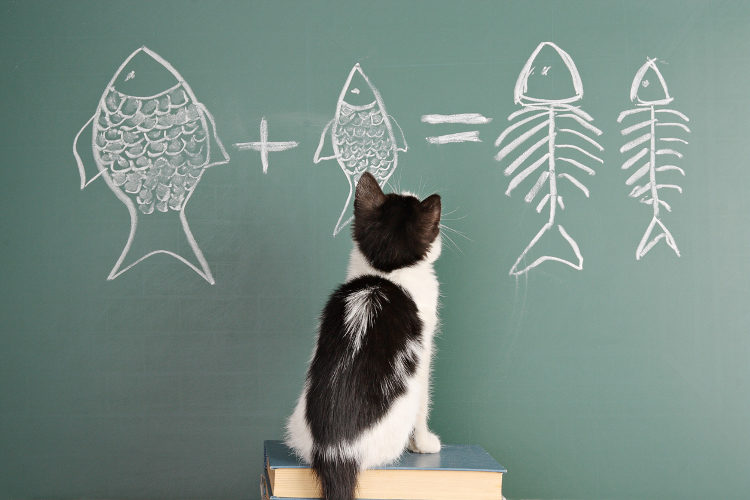In 2014, when Slate’s David Grimm set out to learn why there were so few studies on feline cognition compared to the abundance of research on dogs, scientists almost laughed him off the phone.
“We did one study on cats—and that was enough!” Hungarian scientist Ádám Miklósi, a top animal cognition expert and cat lover, told Grimm with a chuckle.
Christian Agrillo, a comparative psychologist at Italy’s University of Padova, pointed out he’s studied monkeys, birds, and other animals — but cats were by far the most difficult to work with.
“I can assure you that it’s easier to work with fish than cats,” he told Slate. “It’s incredible.”
Agrillo found he couldn’t work with cats in his laboratory. As any cat owner can attest, felines don’t do well in new, uncertain places, so Agrillo tried studying house cats in their natural environments — their homes. Still, most cats “dropped out” due to being uncooperative, leaving the psychologist with just four feline participants for his study into “numerical competence,” which sought to answer whether cats can distinguish between smaller and larger quantities.
Cats: We are not amused
I can picture those uncooperative cats, regarding scientists indifferently before settling down for a nap.
“We will not be pawns in your little games, humans! We are strong, independent-minded, and…wait, did you say there’ll be snacks?!?! When do we start?”
Ultimately, food may be the reason scientists at the University of Kyoto had a bit more luck getting kittens to cooperate — and the resulting study suggests cats are the equal of dogs when it comes to remembering experiences.
To start with, the Japanese scientists were able to get 49 cats to participate in the study. They led each feline into a room where four containers were arranged in a row — two containers held food, one held an “inedible object,” and the fourth was empty.
The cats were allowed to dig into one container of yums before they were shuffled out of the room. Fifteen minutes later, they were led back in, and on the second go-around, they went for the remaining food container.
The Japanese researchers say the study illustrates cats have what’s called episodic memory. That is, they remembered which bowl they’d eaten out of, where it was located, and which bowls they hadn’t touched.
“Episodic memory is viewed as being related to an introspective function of the mind; our study may imply a type of consciousness in cats,” Kyoto University psychologist Saho Takagi told the BBC. “An interesting speculation is that they may enjoy actively recalling memories of their experience like humans.”
But of course cats remember
That won’t come as a surprise to cat owners, who know that kneading and purring — the infamous “making biscuits” routine — is a callback to those worry-free days of kittenhood when they sidled up to mom’s milk dispensers and kneaded their paws against her underside to stimulate the flow of milk.
As for my own little Buddy, he’s got no problem remembering what, where and how. He knows exactly where that big bag of Temptations snacks is, even if I move it, and has no qualms about reaching a shelf and knocking the bag onto the floor as a “subtle” suggestion that it’s time for some yums.
But for scientists, the study is an important step in recognizing that cats have some of the same mental faculties as Fido. For cat people, it’s a bit of vindication for all those times we pushed back against our dog-loving friends in arguments about who has the smarter pet.
Ultimately, the success of the Kyoto scientists means it’s possible to work with cats in studies, and Takagi thinks this kind of research could improve the way we interact with our fur-coated overlords.
“Understanding cats more deeply helps to establish better cat-human relationships,” she told the BBC. “Cats may be as intelligent as dogs, as opposed to the common view of people that dogs are much smarter.”






